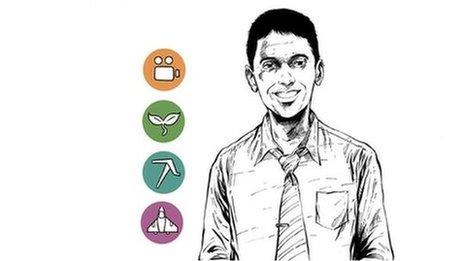Digital Indians: Rikin Gandhi helps farmers with video
- Published

For someone who has become an authority on how to make the most of the ground, Rikin Gandhi spent a lot of his youth looking up at the stars.
Growing up in a New Jersey suburb, the son of an electrical engineer father and a bank cashier mother would cut out articles on astronauts from the Philadelphia Inquirer and devour space biographies.
After school, Rikin chased his dreams relentlessly.
He applied for a pilot's job with the US Navy to get on to the space shuttle programme. A minor eye problem which needed corrective laser surgery came in the way, and he ended up spending a couple of years working on a software project with Oracle and reflecting on a future in space.
Earth overview
"I wondered what happens to astronauts when they return to Earth. I reread their biographies and found that some of these guys would see the world from above and ask themselves, why is there war, why is there poverty? On return, some became public school teachers or farmers to reconnect with the real world," says Mr Gandhi, now 31.
It turned out to be a prescient epiphany of sorts.
The aspiring astronaut returned to his parents' homeland. Firmly grounded, he is now working with farmers in India's teeming villages and trying to improve their lives.
What Mr Gandhi and his 65-member team do at Digital Green, an independent, non-governmental organisation (NGO) that he heads, is simple: train farmers to make and show short videos where they record their problems, share solutions and highlight success stories.
They provide farmers with nifty $200 (£130) handheld, battery-operated, small, handheld pico projectors to show the videos to small groups of people in electricity-starved villages.
By all accounts, this plain vanilla innovation has been a resounding success.
Digital Indians: Rikin Gandhi
In five years since it started, says Mr Gandhi, more than 150,000 farmers have watched 2,600 such videos in 20 different languages in more than 2,000 villages in seven states where Digital Green has a presence. More than half the people watching these videos and putting lessons learnt from them into practice are women.
"The videos are by the farmers, for the farmers. They are demonstrative, have interviews and are often laced with local music.
"They showcase the farmer as the protagonist, producer and exhibitor, increase their status and empower them with new tools. More importantly, they help in sharing farming technologies," says Mr Gandhi, sitting in a cramped conference room in his office in Delhi.
"We call the videos the Pop Idol for farmers," he says, with a grin.
The eight to 10-minute videos try to answer elementary questions that often cloud farmers' minds: How do you select a crop? How do you prepare your land and nursery beds? How do you transplant crops? How do you remove weeds to get a healthier crop?
Films about worms
The most popular videos, says Mr Gandhi, are the ones where farmers are able to draw lessons from experiences with limited financial risks.
Videos about cultivating azolla, an aquatic fern which added to cow fodder increases milk yields, are a hit as are videos on using worms to make compost to fertilise crops. Videos on high-yield rice cultivation and organic farming are equally popular.
Mr Gandhi says they have a vigorous system of mapping outcomes. "About 40% of the people who have seen a video in the last two months," he says, "are found to have adopted one of the practices shown in the video."
When you consider the fact that more than half of Indians living in its 60,000 villages are employed in agriculture, and that farms contribute some 14% to India's gross domestic product, you realise the transformative potential of Mr Gandhi's project.
Mr Gandhi came to India first with a friend to grow jatropha to make biodiesel, a project which flopped. He ended up being hired by Microsoft Research and spent time in villages finding out whether people were receptive to technology.
Somewhere, in between, he even went back to the US to do a doctorate in sustainable development at Columbia University, but "dropped out after a semester mainly because it was very theoretical".
"I thought I'd take a shot at the real thing on ground," he says.
So when he arrived in an Indian village to work on training farmers to produce farm videos, he says he had no expectations and presumptions.
Tech to help poor
"It was all very new to me. What confused me was there were farmers who were doing well next to folks who were not doing well. But then that's the case everywhere, isn't it?" says Mr Gandhi.
Digital innovation in the developing world, he believes, has to reach out to the poor trying to make sense of their lives.
"There are a lot of things we take for granted in the West: strong institutions, finance, infrastructure, capital. You can't always find that in India.
"So it is important to work with existing organisations, governments, NGO [non-governmental organisations], private sector, self-help groups to make technologies work."
Which is what Digital Green does: Mr Gandhi's venture has been supported by Bill and Melinda Gates Foundation and the government of India, among others.
Mr Gandhi, who loves reading sci-fi in his free time, says he's fortunate to see "changes first hand". And no, he says, he does not fret about not becoming a spaceman.
"You know, what," he says, "[for all purposes] the space programme is no longer functional, is it?" Then he chuckles a little more.
- Published10 September 2013
- Published3 September 2013
- Published2 September 2013
- Published24 May 2013
- Published10 May 2013
- Published21 March 2023